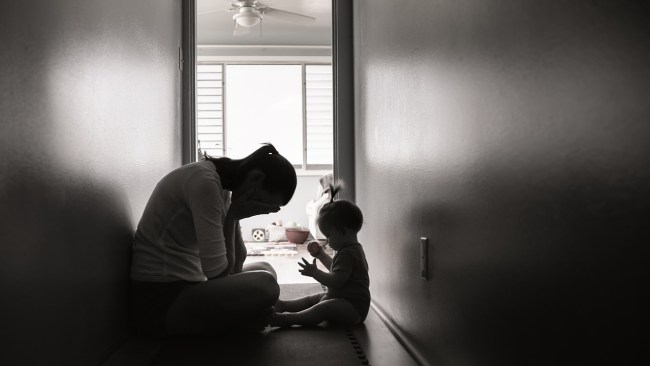Aussie doctor explains why 40 is the official unhappiest age of your life
Are you noticing a shift in your mood as you (and your children) get older? There's a good reason for that.
Lifestyle
Don't miss out on the headlines from Lifestyle. Followed categories will be added to My News.
So here’s a greeting you won’t find on the Hallmark birthday card rack: "Welcome to your 40s – the official unhappiest age of your life!"
For more than 20 years researchers have been studying happiness as a “curve” and they’ve found that in your 40s you’re at your lowest! And frustratingly, you might feel this way for no “real reason”.
There’s no real reason to complain. Everything just feels hard and you just don’t feel the contentment you thought this stage in life would bring you. It’s not you – it's us.
Here’s why in your 40s everything gets “real”, how to recognise the triggers and not to buy into them.
Want to join the family? Sign up to our Kidspot newsletter for more stories like this.

I have definitely noticed, over the past few years especially, a dramatic increase in patients in their 40s coming to see me for vague but strong symptoms. They’re not depressed per se - they just aren’t happy. Something’s not right. The diagnosis for most is the same: in the most colloquial of ways - “Shit gets real.”
Your 40s injects another level of pressure and expectation to your life
The first is a changing sense of values. You aren’t the 20 or 30-year-old career-focused employee who would “sell their soul” to get that promotion. You place being able to attend the world’s longest kindergarten concert as just a high a priority as a board meeting. Which is beautiful and right, but with it comes an overarching pressure and a contradiction of what you always thought you wanted and what now genuinely fuels your soul.
Or maybe the dream of a life with kids has somehow slipped by and you are re-calibrating how you find happiness and what you need at this next stage of your life. All the big questions you thought you would have answered by now.
Do you remember as a kid being asked what you wanted to be when you grew up? Thinking about what your dream house would look like?
By your 40s you are supposed to have that sorted too, to have ticked all the boxes. You no longer compare yourself to those younger than you – but you are comparing yourself to those the same age as you. And you always find a way to make yourself fall short - even if not intentionally.
In your 40s you will have the most people ever relying on you solely
We have a massive aging population and by the time you hit your 40s most of your parents are entering that older, retirement stage of life. You aren’t just juggling what goes on between your four walls. The expectation on you to take on more like planning family activities and holiday events accelerates. More demands on your time.
Except there is no more time. These additional family duties are on top of work, your partner, or any little kids.
When you are in your 40s it is very likely you will have the lowest levels of “self” time or “me” time in your life
Job, kids, friends, exercise, everything and everyone wants a piece of you. And you don’t want to let anyone down. Cause if you let anyone down you will lose the dream. And if YOU don’t cope the whole thing will come crashing down.
So you power on – cause you feel you have to. And then you come to me, convinced that nothing is wrong but feeling like the weight of the world is on your shoulders… because it is.
Starting to see what I mean?
Shit gets real.
So, how do we fix it?
RELATED: Signs your child is struggling with mental health

My biggest piece of advice is to first acknowledge what's going on
Understand that all of this chaos comes with frustrations, stress, tiredness, and maybe a little unhappiness. There IS a lot going on and you are allowed to be “over it”.
A vast majority of my patients are reassured when they realise they aren’t the only ones feeling like this.
Work out your glass balls and your plastic balls
In any one day or week, your glass balls are the parts of your life that you simply can’t drop. Your plastic balls are the bits that today, this week, and maybe even for months, really don’t matter in the grand scheme of things. They can drop and be ok, they will bounce.
There’s an example I always give to busy mums who come to see me.
Imagine a week when you’ve got a major deadline for a major project. It’s linked to your bonus, which is obviously linked to making ends meet. Putting the kids to bed with a snuggle and few pages of their favourite book keeps you grounded, and is exactly what they need. These are your two glass balls for the week.
So do the kids really need a three course meal for dinner, or can they survive on some chicken nuggets for a night or two? Do they really need a shower before bed? Do you really have to vacuum for the third time since the weekend?
These are your plastic balls, and this week they’re just not as important. And that’s ok.
RELATED: Mum-shaming is bad for mental health
Make a big deal out of the little wins
All in all, today was ok. Not amazing. OK and that’s enough.
Everyone got to work on time, homework got done, yes dinner was a little burnt, but everyone got to bed at a reasonable hour - win, win, win, win!
And those wins have nothing to do with brand names, the size of your house, or what stamps you have on your passport.
Talk to your GP
I can’t tell you the number of times I have seen a patient on a Monday and their husband or partner on the Tuesday – both unaware the other has come to see me. Both struggling with exactly the same feeling of being overwhelmed, of everything being hard and life in their 40s not being what they’d envisaged.
The GP is your safety net. We won’t judge. We are there to listen, to diagnose, to help. Even the most vague of symptoms, can be a starting point for help during this tricky, “real” part of your life.
For my female patients, we are constantly learning more about peri-menopause. Perimenopause can affect women as young as 35 and can keep going until early 50’s. In a recent study it was found a common symptom or sentiment shared by many women of peri-menopausal age was not feeling like myself or ‘NFLM’. Powerful.
Even a symptom you think is vague or just a “feeling” you have is worthy of discussion and investigation. In that moment when you are with me, I am there for YOU – there are no right or wrong answers. It is about what you are feeling and how we can help. For some people, it might mean more clinical investigation, and sometimes, referring you to someone better equipped with giving you the tools to become stronger and get through.
Consider a psychologist
These professionals are not your partner, your mother, or your best friend - they’ve got no invested interest in your personal life. They’re trained to help you navigate through the chaos, prioritise those glass and plastic balls, and help you with some new coping strategies - so you have more tools in your toolbox.
It's OK to triage your life to decide what you do and don’t have room for right now. And you don’t have to feel guilty about the decisions you make.
More Coverage
Originally published as Aussie doctor explains why 40 is the official unhappiest age of your life









